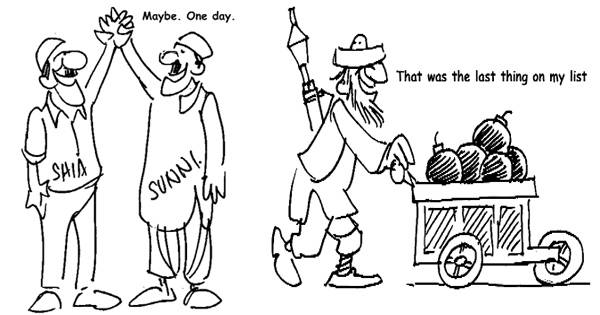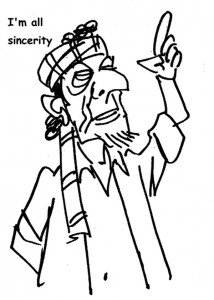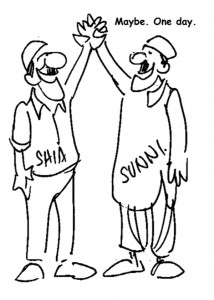
Another year, another flood

Sir,
As in previous years, the country is beginning to witness the onset of floods triggered by heavy rains in southern Punjab and Sindh. Some 42 people have lost their lives in different incidents, and the flooding has damaged thousands of acres of crops and large numbers of livestock. Many people have been forced to leave their homes and live in the open. Hundreds of villages are badly hit, many having been marooned by exceptionally high flash floods in Sindh.
This is not the first time that Pakistan has faced the challenges that accompany heavy monsoon floods. The floods of August 2013 caused serious loss of life and widespread damage to crops and livestock. According to ReliefWeb, which works in conjunction with the United Nations Office for the Coordination of Humanitarian Affairs, nearly 1.5 million people, almost 80,000 houses and 1.5 million acres of crops were affected. According to government reports, the earlier 2010 floods left over 127,000 villages inundated while thousands lost their lives.
In other parts of the world, governments brace themselves for potential floods by pursuing long-term strategies, such as constructing dams, which not only reduce the danger to people, crops, livestock and infrastructure, but also help produce relatively cheap electricity. Unluckily, Pakistan is the only country in the world where the government has no long-term policy in place for handling floods. Building dams, especially the Kalabagh dam project, is not a policy priority. The political leadership has politicized the Kalabagh dam issue and appears reluctant to resolve a matter that could prove to be a lifeline for the country’s economy.
Both the government and opposition parties should focus on constructing more dams – a step with clear advantages for Pakistan – otherwise, the country will find itself worse off in the future.
Khazir Klasra,
Islamabad.
Altaf’s speech

Sir,
The media has correctly lit a fire under Altaf Hussain’s latest speeches. There is no doubt that the MQM’s sincerity, as far as the national interest is concerned, has always been something of a question mark. As the fourth-largest party of Pakistan, the MQM should not be vilifying the country or the state. Altaf Hussain’s speech, as reported in the Hindustan Times, in which he decries the division of the Subcontinent as an historical blunder, effectively denounces the two-nation theory. This principle, for which Quaid-e-Azam struggled till the end – and which resulted in the formation of Pakistan – was the bedrock of the Pakistan movement. Sadly, it seems to mean very little to Pakistan’s present-day leaders.
It should not be deemed acceptable for political leaders to make such speeches against the Pakistan army, the government and, most of all, the Rangers who are on the frontlines in protecting the country. Let us not forget that the MQM is already in hot water after the Imran Farooq murder case, which Scotland Yard is currently investigating. It is very disheartening and I strongly feel that the party should study Pakistan’s history closely to understand why Partition came about.
Nasrullah Ali Baloch,
Karachi.
Stop ISIS funding

Sir,
It is time for us to take on ISIS and expose it for what it really is: an organization, which like other terrorists operating in the garb of their distorted version of Islam, has inflicted pain on Muslims all over the world – killing, maiming, spreading the venom of sectarian strife, weakening countries with a majority Muslim population and leaving them unable to confront external threats from those who have exploited religion to create this monster.
Today, Islam, a religion whose Prophet (PBUH) preached peace, tolerance, patience, knowledge and human values, has been misrepresented and twisted into an image that only those who oppose Islam would like to believe in. Since these various terrorist organizations have emerged, numerous Muslim-majority countries have come close to disintegration and been reduced to pariah states. Countries like Afghanistan have been reduced to rubble, while nations such as Iraq, Syria and Libya have been engulfed by civil war.
Pakistan, as the sole nuclear power in the Islamic bloc, is on the radar of those who have masterminded these terrorists. They are out to destroy our institutions, foment ethnic and sectarian strife, and exploit the corrupt bureaucracy and security apparatus. If we allow them to succeed, they will happily watch us disintegrate from within.
Unless we cut off its sources of funding, this Frankenstein cannot be defeated. Both the criminal economy and external finances need to be eliminated. Rampant corruption, money laundering, the unchecked flight of capital and the ease with which the criminal economy is booming all serve to fuel terrorism. Pakistan’s disciplined military under the able leadership of General Raheel Sharif must work in cohesion with the elected civil government, ensuring that the Constitution remains supreme and nobody is above the law. Otherwise, history will never forgive them. Laws are there to be implemented, not broken as is being done in Pakistan.
Malik Tariq,
Dubai.
Reham’s degree

Sir,
Imran Khan, his wife and his party will always be in the limelight as a result of one controversy or the other. However, when I chose to support the PTI, it was because of Imran Khan – not because of his allies or his wife Reham Khan. Since the party came into being, what I see is his stance as a political figure, his policy vision and his efforts to prove himself in KP. I am not happy about the old faces that have joined the PTI from other parties – I don’t trust them – but, on a positive note, anyone who opposes corruption and is sincere about serving their nation will be inclined to join the PTI.
Allegations of a fake degree have called Reham’s education credentials into question. She may not have completed a degree in journalism at North Lindsay College, but my reasons for supporting the PTI are clear: it is when I see Imran Khan celebrating Eid with IDPs in Bannu (while Asif Zardari celebrates in Dubai and Nawaz Sharif celebrates in Saudi Arabia) that I am willing to place my hope in his political sincerity. He has no corruption cases against him, unlike Zardari, unlike the Ayaan money smuggling case, unlike allegations of the PML-N scandal of smuggled kilos of gold, and unlike the MQM’s money laundering cases.
Imran Khan has gained nothing from politics: he lives in the same house he built long ago and he is not out to create a political family empire like the PPP or PML-N. His progress in KP has been far better than that of the other provinces. This new scandal around Reham Khan has raised many questions, but such baseless allegations have risen ever since her marriage to Imran Khan. It doesn’t change his political sincerity.
Afsheen Qureshi,
Lahore.
A turbulent history

Sir,
The 15 May and 17 July issues of The Friday Times featured reports in connection with the recent Safoora Goth massacre in Karachi, where 43 Shia Ismaili passengers on a bus were shot and killed, one by one. But there is a deeper story underlying the tragedy. The centuries may have passed, but the times haven’t changed as far as the Ismaili community is concerned. In over a millennium, the culturally diverse, intellectually vibrant, progressive and pluralistic Ismaili community and its imamate have faced political, theological and intellectual persecution under the Umayyad, Abbasid, Seljuq, Mongol, Timurid, Safavid and Ottoman dynasties.
The Umayyad oppression of the Ahl al-Bayt and the hostility of Mu‘awiya and his successors towards these supporters of Ali and his sons are no secret. Immediately after the death of the Prophet (PBUH), Imam Ali bin Abu Talib (632–661) was denied the right to succession. The sect itself has been subject to numerous schisms since it came into being in 765 AD. But the implicit animosity towards it runs deeper here than it might elsewhere – and this has developed over centuries with no sign of change.
It is hardly surprising this should be so when seminaries are producing demagogues and hatemongers, when university teachers are earning cut-and-paste PhDs to secure their tenure rather than engage in intellectual creativity. There is no application of rationality and no challenge to existing orthodoxies and taboos in the social and natural sciences. Nor have state mechanisms or religious practices changed for the better so as to counter discriminatory traditional structures. All we have is tunnel vision, spewing more hatred and more venom in colleges and universities. It is ironic to consider that an Afghan court should have accepted DNA as credible scientific evidence in rape cases while the Council for Islamic Ideology in Pakistan has ruled the opposite.
Reading through historical records, one sees that the persecution of the Ismaili community is as real as that of the rest of the Shi’ite community. In the eleventh century, Sultan Malik Shah was one of the first to target the Nizari Ismailis – derisively calling them the ‘Hashshashin’ or hashish smokers – while Sultan Barkiyaruq besieged a fortress in the mountains of Isfahan from where he organised the assassination of several Ismaili leaders. Ibn al-Qalanisi referred to the Ismailis and their message as “malicious” while Ata Malik Juvaini (1226–1283), Hulagu Khan’s court historian, termed them “heretics” in his book The History of the World Conqueror. Izz ad-Din Ibn al-Athir (1160–1233), author of The Complete History, derided the Ismaili community as an “affliction”.
Mongol rulers such as Hulagu Khan and Genghis Khan were power-hunger usurpers who saw the Ismailis as yet another hurdle between them and world domination. Salah-ad-Din Ayyubi was severely opposed to Fatimid rule (Nizari) as were the Seljuqs. As sworn enemies of the Nizari Ismailis, they did not hesitate to massacre them. If the chronicles of the time are to be believed, the sect was abhorred in the Muslim world as heretics and, equally, found as little favour among the Christian world.
The split in the Shi’ite occurred between the Seveners and the Twelvers (Ithna Ashari Shias), the two main offshoots of Shi’ism, over the sixth imam, Muhammad Ismail. Followers of Jafar Sadiq split into the Druz and mainstream Ismailis. Sadiq had two sons, Muhammad Ismail and Musa Al Kazim, who the Twelvers regarded as the rightful successor. Muhammad Ismail predeceased his father as imam. Those who believed he was the Mahdi who would return again to earth were termed the Seveners. Thus started the Fatimid era with the eighth imam, Ahmad Al-Wafi, continuing until the death of the 18th imam, Al-Mustansir Billah (1094 AD).
The regent Malik al-Afdal placed Al-Mustansir’s younger son, Al-Musta’li, on the throne; this was contested by the elder son, Al-Nizar, who was defeated and died in prison. The dispute led the Seveners to split into two branches: the Nizari and the Musta’li. The Musta’li split into two further branches: the Hafizi and the Tayyibi (the Dawoodi Bohra). The Nizaris continued with the succession, but with occultation imams – Nizar, Al-Muhtadi, Al-Qahir – and with revealed imams till the present 49th imam. The Nizari sect itself has seen many ups and downs, but has always bounced back vigorously.
In the last century, despite a long history of persecution, the Aga Khan III ensured that Turkey was treated fairly in the aftermath of the First World War; he also campaigned for the safety of the Sunni Ottoman Caliphate. Only two decades earlier, the same caliphate had persecuted the Nizari Isma‘ilis of Syria – now, it was the Isma‘ili imam who came to their rescue. As the Aga Khan III writes, his sect was “often persecuted and oppressed, [but] the faith of my ancestors was never destroyed; at times it flourished as in the epoch of the Fatimite Khalifs; at times it was obscured and little understood.”
What lesson are we to learn from history? If the brutal distortion of religion is not stopped and equal rights and citizenship not accorded to all, irrespective of sect and gender, our seats of learning will produce an army of Sadia Jalals (Jalal, a university professor, was arrested for her role in ‘facilitating the suspects of the Safoora carnage’. According to media reports, she had been ‘brainwashing’ her students in an attempt to recruit them as members of a terrorist outfit). The literacy rate may have increased, but it is divorced from ethics, tolerance for diverse faiths and practices, and humanity.
Abdul Ali,
Gilgit.

